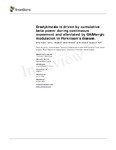Bradykinesia is driven by cumulative beta power during continuous movement and alleviated by GABAergic modulation in Parkinson’s disease.
| dc.contributor.author | prokic, E | |
| dc.contributor.author | Woodhall, G | |
| dc.contributor.author | Williams, A | |
| dc.contributor.author | Stanford, I | |
| dc.contributor.author | Hall, Stephen | |
| dc.date.accessioned | 2019-11-27T13:01:05Z | |
| dc.date.issued | 2019-12-20 | |
| dc.identifier.issn | 1664-2295 | |
| dc.identifier.issn | 1664-2295 | |
| dc.identifier.other | ARTN 1298 | |
| dc.identifier.uri | http://hdl.handle.net/10026.1/15199 | |
| dc.description | No embargo required | |
| dc.description.abstract |
Spontaneous and "event-related" motor cortex oscillations in the beta (15-30 Hz) frequency range are well-established phenomena. However, the precise functional significance of these features is uncertain. An understanding of the specific function is of importance for the treatment of Parkinson's disease (PD), where attenuation of augmented beta throughout the motor network coincides with functional improvement. Previous research using a discrete movement task identified normalization of elevated spontaneous beta and postmovement beta rebound following GABAergic modulation. Here, we explore the effects of the gamma-aminobutyric acid type A modulator, zolpidem, on beta power during the performance of serial movement in 17 (15M, 2F; mean age, 66 ± 6.3 years) PD patients, using a repeated-measures, double-blinded, randomized, placebo-control design. Motor symptoms were monitored before and after treatment, using time-based Unified Parkinson's Disease Rating Scale measurements and beta oscillations in primary motor cortex (M1) were measured during a serial-movement task, using magnetoencephalography. We demonstrate that a cumulative increase in M1 beta power during a 10-s tapping trial is reduced following zolpidem, but not placebo, which is accompanied by an improvement in movement speed and efficacy. This work provides a clear mechanism for the generation of abnormally elevated beta power in PD and demonstrates that perimovement beta accumulation drives the slowing, and impaired initiation, of movement. These findings further indicate a role for GABAergic modulation in bradykinesia in PD, which merits further exploration as a therapeutic target. | |
| dc.format.extent | 1298- | |
| dc.format.medium | Electronic-eCollection | |
| dc.language | eng | |
| dc.language.iso | en | |
| dc.publisher | Frontiers Media | |
| dc.subject | magnetoencephalography | |
| dc.subject | oscillations | |
| dc.subject | movement | |
| dc.subject | GABA | |
| dc.subject | zolpidem | |
| dc.title | Bradykinesia is driven by cumulative beta power during continuous movement and alleviated by GABAergic modulation in Parkinson’s disease. | |
| dc.type | journal-article | |
| dc.type | Journal Article | |
| plymouth.author-url | https://www.webofscience.com/api/gateway?GWVersion=2&SrcApp=PARTNER_APP&SrcAuth=LinksAMR&KeyUT=WOS:000505704500001&DestLinkType=FullRecord&DestApp=ALL_WOS&UsrCustomerID=11bb513d99f797142bcfeffcc58ea008 | |
| plymouth.volume | 10 | |
| plymouth.publication-status | Published online | |
| plymouth.journal | Frontiers in Neurology | |
| dc.identifier.doi | 10.3389/fneur.2019.01298 | |
| plymouth.organisational-group | /Plymouth | |
| plymouth.organisational-group | /Plymouth/Faculty of Health | |
| plymouth.organisational-group | /Plymouth/Faculty of Health/School of Psychology | |
| plymouth.organisational-group | /Plymouth/REF 2021 Researchers by UoA | |
| plymouth.organisational-group | /Plymouth/REF 2021 Researchers by UoA/UoA04 Psychology, Psychiatry and Neuroscience | |
| plymouth.organisational-group | /Plymouth/REF 2021 Researchers by UoA/UoA04 Psychology, Psychiatry and Neuroscience/UoA04 REF peer reviewers | |
| plymouth.organisational-group | /Plymouth/Research Groups | |
| plymouth.organisational-group | /Plymouth/Research Groups/FoH - Applied Parkinson's Research | |
| plymouth.organisational-group | /Plymouth/Users by role | |
| plymouth.organisational-group | /Plymouth/Users by role/Academics | |
| dc.publisher.place | Switzerland | |
| dcterms.dateAccepted | 2019-11-25 | |
| dc.rights.embargodate | 2020-1-3 | |
| dc.identifier.eissn | 1664-2295 | |
| dc.rights.embargoperiod | Not known | |
| rioxxterms.versionofrecord | 10.3389/fneur.2019.01298 | |
| rioxxterms.licenseref.uri | http://www.rioxx.net/licenses/all-rights-reserved | |
| rioxxterms.type | Journal Article/Review |


